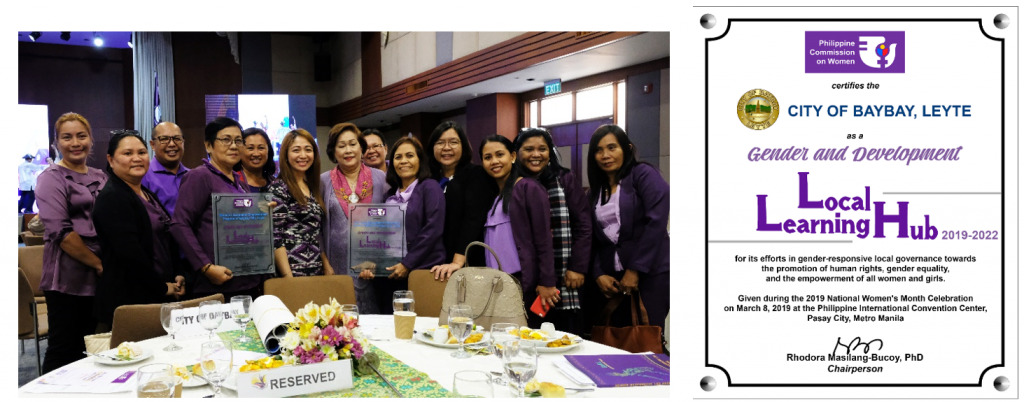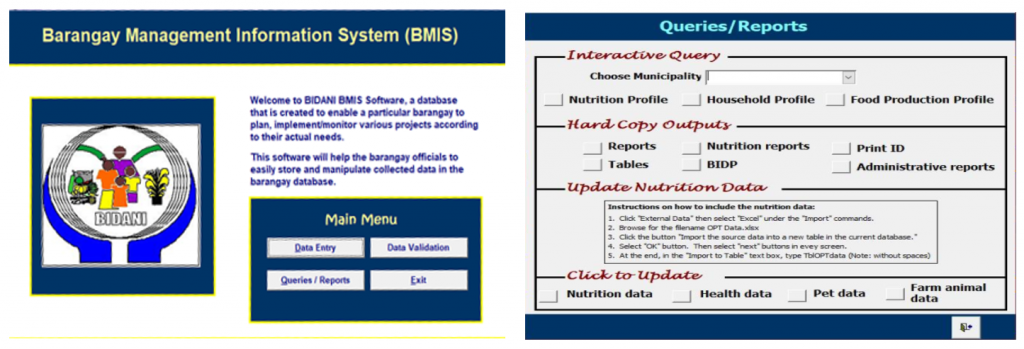Baybay City GAD LLHs: Programs toward Gender-responsive Planning and Women’s Economic Empowerment

Baybay City was among the seven (7) LGUs recognized by the PCW for its notable GAD programs in 2019 on the importance of collection and use of community-based data and efforts to improve women’s economic empowerment. With the certification of its two (2) programs, the City sustained its commitment to implement them towards achievement of gender-responsive goals in planning processes and empowering women.
Barangay Management Information System

Pursuant to the City Ordinance No. 7, Series of 2014, the Barangay Management Information System (BMIS) was established in all barangays of Baybay City. The BMIS collects and utilizes barangay-based data to assess the situation of community and identify their needs and problems. It gathers demographic information of household members such as age, sex, civil status, educational attainment, among others. In addition, it captures the environmental profile of locality including general situation of barangay, available infrastructure facilities, household locations, and land utilization with spot map. Baybay City Government bases the approval of barangay budget on their compliance in updating of BMIS and submission of necessary reports to the City Planning and Development Office.

As a repository of sex-disaggregated data (SDD), the LGU uses the information in the BMIS for gender-based analysis to identify gender-related issues of its constituents and develop gender-responsive local development plans. With fact-based gender issues, the City Planning and Development, Social Welfare and Development, Engineering, and GAD Offices as well as other offices and stake holders are equipped with clear basis in developing gender-responsive plans, programs, activities, and projects. For instance, the City Planning and Development and Engineering Offices utilize data on availability of comfort rooms on households as basis of provision of materials for the construction of comfort rooms to households without such facility. The City Social Welfare and Development Office (CSWDO) uses the data and information on household income in targeting beneficiaries of social amelioration programs while the GAD Office, in collaboration with CSWDO use these data as basis of provision of livelihood services. Through the use of BMIS, individuals and household in need of access to comfort rooms, economic opportunities, and other services are identified and prioritized.
Since its implementation, the data generated from the BMIS have been used in the formulation and updating of local development plans such as LGU GAD Plan and Budget, City Social Welfare and Development, Disaster Risk Reduction Management Plans, among others. To oversee the implementation of the BMIS and to sustain the capacity development activities of its implementers, the City Management Information System (CMIS) team was established in 2010. The BMIS intends to strengthen collection and utilization of SDD and other data that can be used in gender-based analysis and gender-responsive decision-making. With its admirable uses and accomplishments, all LGUs are encouraged to establish similar database to further make their planning and implementation processes more gender-responsive.
Women’s Economic Empowerment Program

Baybay City was a pilot LGU under the PCW- GREAT Women Project Phase 1 – Local Enabling Environment component, which created a strong convergence program among its stakeholders. This paved the way for the sustained implementation of WEE Program spearheaded by the City GAD Office.
The WEE Program provides livelihood assistance to six (6) women micro-entrepreneur organizations (WMOs), 20 select women entrepreneur groups, and 565 women entrepreneurs of Baybay City barangays. It also delivers relevant capacity development activities on product development and enhancement to enhance their skills in managing business. In addition, the GAD Office assists them when they participate in trade fairs. To ensure sustainable growth of the women-led enterprises, the City also provides the equipment and machineries for processing raw materials to six (6) WMOs including: Masagana Rural Improvement Club (Poblacion Zone 1); Bubon Rural Improvement Club (Barangay Bubon); United Plaridel Weavers Association for Rapid Development (Barangay Plaridel); Baybay Food Processors Association (Barangay Cogon); Bunga Women’s Association (Barangay Bunga); and San Agustin Handicrafters Association (Barangay San Agustin).
The program has provided women micro-entrepreneur organizations with economic opportunities to support themselves and their families. Most importantly it granted self-reliance and economic independency among its women beneficiaries.
The WEE Program continuously empowers women beneficiaries not only for economic advancement but also to become self-reliant especially in making day-to-day decisions for their respective enterprises One of the admirable impacts of the Program is the promotion of joint household management and responsibilities among the women and their partners. The WEE Program Team and some of the women beneficiaries affirmed that since they participate in economic activities, some of their partners are now doing reproductive activities such as taking care of the children, preparing food for the family, among others. These accomplishments show that the WEE Program plays an essential role in achieving the GEWE Plan strategic goal area on Expanded Economic Opportunity for Women by enabling women from the marginalized groups to access entrepreneurial activities and services.
GAD LLH Coordinator:
GAD Focal Person Mora Abarquez
Email address: baybaycity0616@yahoo.com
(053) 3352045
GAD Local Learning Hubs:
Abra de Ilog (Likha Iraya)
Aklan (ACCW and MOVE-Aklan Chapter)
Baybay City (BMIS and WEE Program)
Davao City (IGDD, OSC-VAW, CMC, and Ray of Hope Village)
Iloilo (Convergence for Women’s Economic Empowerment Program)
Mabalacat City (Early Childhood Care and Development Program)
Misamis Occidental (PGADO)
Naga (Bantay Familia, GROW Negosyo Program, and Breast Feeding Program)
Palawan (LWC)
Pangasinan (PCIC)
Quezon City (QCPC and Social Hygiene and Sundown Clinics)
Quezon Province (PGADO, LKB Program, and 2-in-1 Program)

